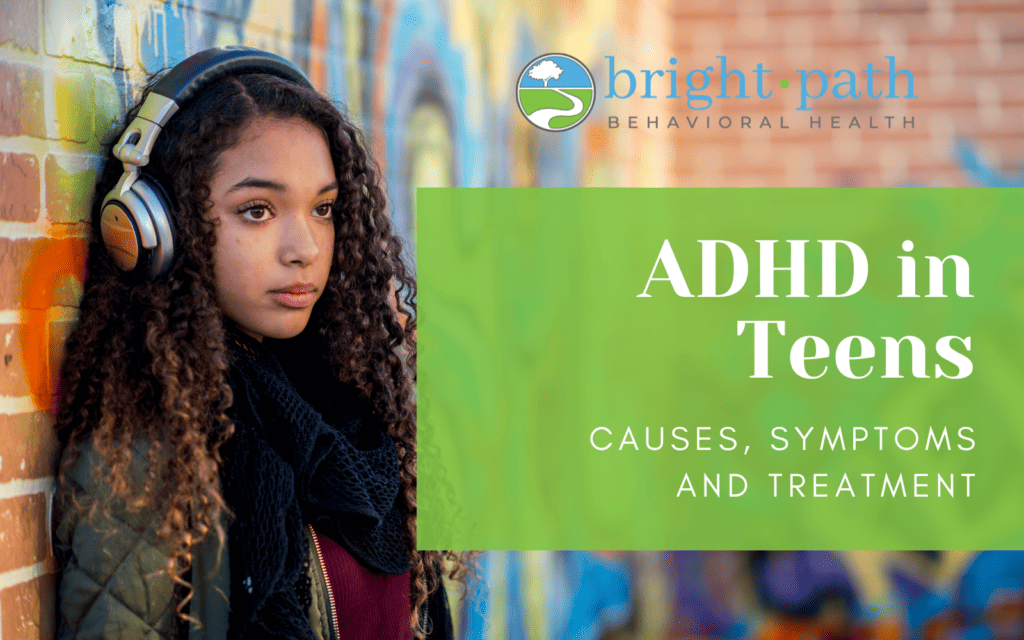Attention Deficit Hyperactivity Disorder (ADHD) is a neurodevelopmental condition characterized by distinct brain differences that impact attention and behavior. Individuals with ADHD often find themselves more easily distracted, making it challenging to focus, listen, wait, or manage time effectively.
According to the Centers for Disease Control and Prevention (CDC), in 2016, around 6.1 million children in the United States, which is about 9.4% of the population aged between 2 and 17, were diagnosed with ADHD. This percentage increases to 13.6% among adolescents aged 12 to 17, indicating a significant prevalence in the teenage demographic.
Causes of ADHD are attributed to neurological variances that influence attention and behavior. These disparities are not solely linked to environmental factors but are rooted in inherent brain differences.
Symptoms of ADHD manifest in various problems that impact daily life. Individuals with ADHD often struggle with sustained attention, impulsivity, and hyperactivity. This can result in difficulties in academic settings, relationships, and daily routine disruptions.
Effective treatments exist to manage its symptoms and enhance functioning. Tailored interventions may include behavioral therapy, educational support, and, in some cases, medication. With the right support system and interventions in place, individuals with ADHD can navigate life more successfully and cultivate their full potential.
What Are The Causes of ADHD in Teens?
The causes of ADHD in adolescents are listed below:
Genetics
ADHD tends to be hereditary, and it is believed that the genes inherited from one’s parents play a significant role in the development of the condition. Studies indicate that individuals with ADHD are more likely to have parents and siblings with the same condition. However, how ADHD is passed down is likely to be complex and is not believed to be caused by a single genetic mutation.
Brain Function and Structure
According to the NHS, it has been found through research that there could be differences in the brains of individuals with ADHD compared to those who do not have the condition. However, the exact significance of these differences is not yet clear.
For instance, studies conducted using brain scans have indicated that some regions of the brain might be smaller in individuals with ADHD while other regions might be larger. Other research has suggested that there may be an imbalance in the level of neurotransmitters in the brain of people with ADHD or that these chemicals might not function properly.
Groups at Risk
Some individuals are thought to have a higher likelihood of developing ADHD. These individuals include those who were born prematurely (before the 37th week of pregnancy) or with low birth weight, those who have epilepsy, and those who have experienced brain damage – either in utero or as a result of a severe head injury later in life.
What Are The Signs and Symptoms of ADHD in Teens?
Not every teenager exhibits all the symptoms of ADHD, and even if a few signs are present, it doesn’t necessarily confirm the diagnosis. Here are 16 ways in which ADHD can manifest in adolescents:
- Lack of Focus: Teens with ADHD may struggle to stay on task, often initiating projects but having difficulty finishing them. Being easily distracted can result in careless errors at school, work, or home.
- Disorganization: While everyone misplaces items occasionally, for a teen with ADHD, this can be a recurring issue, leading to prolonged searches for possessions and difficulties managing time, resulting in missed appointments and deadlines.
- Self-focused Behavior: Teens with ADHD may find it challenging to discern the needs or desires of others, experiencing difficulty waiting for their turn or recognizing social cues.
- Fidgeting: Restlessness is a common ADHD symptom, making it difficult for individuals to sit still without squirming or getting up.
- Heightened Emotionality: Research suggests that emotional maturity in individuals with ADHD may lag behind that of their peers, potentially leading to angry outbursts and dramatic scenes during adolescence.
- Fear of Rejection: Rejection-sensitive dysphoria, prevalent in neurodevelopmental disorders like ADHD, can trigger intense emotional reactions to perceived rejection, teasing, or criticism.
- Daydreaming: Individuals with ADHD may frequently be immersed in daydreams for extended periods.
- Impulsivity: Teenagers with ADHD may struggle with resisting impulses, making them prone to impulsive and potentially risky decisions.
- Difficulty Following a Conversation: ADHD can disrupt conversational skills, leading to behaviors such as inattentiveness, interrupting, talking excessively, leaving mid-conversation, or intruding into others’ discussions.
- Procrastination: Procrastination, stemming from a lack of focus, becomes noticeable in tasks that require extended periods, with teens often delaying homework or other responsibilities until missing deadlines.
- Trouble Working Quietly: Quiet activities pose challenges for teens with ADHD, who may find it hard to engage in solitary activities like reading or working on projects.
- Always “On the Go”: While teens with ADHD may exhibit fewer hyperactive symptoms than younger children, some may constantly shift from one activity to another, displaying a flurry of energy.
- Trouble Reading Social Cues: Difficulty in recognizing interruptions or irritations in others may make it challenging for teens with ADHD to establish or maintain friendships.
- Trouble Compromising with Others: The combination of lack of focus, difficulty in following conversations, and challenges in understanding social cues can hinder the ability to compromise with others.
- Personal Hygiene Issues: While not universal, some teens with ADHD may struggle with maintaining personal hygiene, potentially tied to issues of disorganization and procrastination.
- Difficulty Following Directions: Lack of focus, restlessness, and mind-wandering can make it exceptionally challenging for teens with ADHD to adhere to detailed instructions.
Side effects of ADHD in teens
Many teenagers who have ADHD face difficulties in school due to issues with distraction and poor concentration. Their grades may suffer, particularly if they are not receiving treatment for their condition.
It is common for teenagers with ADHD to forget about assignments, misplace textbooks, and find their daily classwork uninteresting. They may exhibit inattentiveness or hyperfocus, frequently interrupting their teacher and classmates and answering questions without waiting their turn. They may also rush through assignments and fidget, making it difficult to stay seated in class.
Due to their tendency to prioritize other things over the task at hand, teens with ADHD often forget what they are supposed to do. This can be particularly apparent when completing homework, developing athletic skills, and forming peer relationships. As a result, they may receive poor grades on exams and be overlooked for participation in sports teams, after-school activities, and social groups.

Does ADHD Raise the Risk of Car Accidents and Problem Drinking?
Indeed, driving presents particular hazards for adolescents with ADHD. Those with ADHD are two to four times more prone to car accidents compared to their counterparts without the condition. The impulsivity, risk-taking tendencies, immature judgment, and inclination for thrill-seeking behavior in teens with ADHD significantly elevate the likelihood of accidents and severe injuries.
However, research indicates that teenage drivers with ADHD who adhere to their medication regimen exhibit a decreased likelihood of being involved in accidents. Medication, when consistently taken, appears to be a mitigating factor in reducing the risks associated with ADHD-related driving challenges.
Moreover, teenagers diagnosed with ADHD are more inclined to engage in heavy drinking compared to their non-ADHD peers, leading to a higher likelihood of associated problems. Studies reveal that adolescents with ADHD are twice as likely to have abused alcohol in the past six months and three times more likely to misuse drugs other than marijuana.
Obtaining appropriate treatment for ADHD holds promise in reducing the risk of subsequent alcohol and drug abuse. When considering driving privileges for your teenager, it’s essential to integrate discussions about ADHD management into the overall treatment plan. As a responsible parent, establishing clear rules and expectations regarding safe driving behaviors is crucial, including addressing the risks associated with texting and talking on the phone while driving.
How can ADHD Affect a Teen’s Relationships?
Not every child who has ADHD experiences difficulties in getting along with others. If your child is struggling, there are ways you can assist in improving their social skills and relationships.
Addressing your child’s peer issues earlier will lead to more tremendous success. It is crucial to:
- Understand the significance of having healthy relationships with peers.
- Engage your child in activities with other children. Selecting an activity that your child is good at or enjoys can help them feel more confident about interacting with peers.
- Establish social behavior goals with your child and create a reward system.
- Encourage social interactions if your child tends to be shy or withdrawn.
- Before attending an event, prepare your child by discussing what they should expect and what others may anticipate from them.
- Avoid trying to do too much at once. Start with one or two habits to work on at a time.
- Don’t overdo it. Your child does not need to be a part of the most popular group or have many friends. One or two close friendships may be all they need.
- Communicate with your child’s teachers about how they are doing in class. Collaborate with them and the guidance counselor to resolve conflicts that could interfere with friendships.
Children with ADHD can also become victims of bullying. Be prepared. Talk with your child about what they should do if they are teased or bullied, and ensure they know it is okay to report it to you.
Treatments: How to Help Teens With ADHD?
Approximately 15% of individuals diagnosed with ADHD continue to exhibit symptoms at the age of 25, with 65% still contending with symptoms impacting their daily lives. The approach to treatment varies based on the severity of symptoms, often involving a combination of medication and behavioral therapy. It is crucial to consider co-existing conditions, such as anxiety or depression, as integral components of the comprehensive treatment plan.
Medication
Approximately 70% of teenagers respond positively to stimulant medications, including options like dextroamphetamine (Dexedrine), dextroamphetamine-amphetamine (Adderall XR, Mydayis), lisdexamfetamine (Vyvanse), and methylphenidate (Ritalin, Focalin). Treatment typically begins with the lowest feasible dose, with adjustments made as necessary. Consultation with a doctor is essential to discuss the medication’s potential benefits and side effects.
Behavioral Therapy
Behavioral therapy proves valuable in helping teenagers and their parents develop coping mechanisms for handling emotions and navigating the challenges associated with ADHD. This form of therapy may encompass training in social skills, problem-solving, and organizational skills.
Diet and Lifestyle Changes
Research suggests that adopting specific lifestyle choices can positively impact children with ADHD. This includes maintaining a balanced diet rich in vegetables, fruits, whole grains, and lean protein, replacing sugary drinks with water, minimizing caffeine intake, engaging in daily exercise, limiting screen time—especially before bedtime—and ensuring adequate sleep. Discussing your teenager’s daily habits with their doctor can help identify areas where improvements can be made.
Overall, a comprehensive and individualized approach to treating ADHD in teens involves considering medication, behavioral therapy, and lifestyle adjustments, with careful attention to co-existing conditions. Open communication with healthcare professionals is crucial in tailoring an effective treatment plan for each adolescent.
Can You Treat ADHD Without Medication?
Behavioral therapy, guidance for parents, classroom assistance, and adjustments to routines are beneficial strategies for aiding children with attention deficit hyperactivity disorder (ADHD).
Nevertheless, health organizations recommend considering ADHD medications for children aged 6 years and older in conjunction with these methods whenever feasible. Some research indicates that medication may induce favorable alterations in brain structure.
In instances where medication is neither feasible nor advantageous for a child with ADHD, non-pharmacological interventions remain viable alternatives to support the child’s well-being.
What Happens If ADHD Goes Untreated?
Children with ADHD may find it hard to handle their emotions, making it challenging to pick up on social cues. This struggle can make it tricky for them to make friends, and they might feel left out. If parents or guardians don’t pay attention to their signs and symptoms, these kids could eventually show signs of depression and low self-esteem.
Without proper treatment, children with ADHD might act more impulsively and get hurt more often, as shown by a study reporting more hospital visits for injuries among young people with ADHD compared to others.
If ADHD goes untreated into adolescence or adulthood, it can lead to difficulties in relationships and a lack of friends. It may also result in poor school performance and a higher chance of dropping out of college later. Many teens with undiagnosed ADHD struggle with eating disorders and might engage in risky behaviors like drug misuse or excessive alcohol consumption. Identifying and addressing ADHD early on is crucial to help prevent these potential long-term challenges.

How to Prevent ADHD in Teens?
Preventing ADHD in teenagers involves various strategies, which start with ensuring good prenatal care. Complications during pregnancy are linked to ADHD. Therefore, maintaining a healthy diet, regular doctor visits, and abstaining from alcohol and drugs are essential preventive measures. Maternal smoking during pregnancy doubles the likelihood of ADHD in children. Several studies have explored potential links between lead exposure, premature birth, and ADHD.
Adopting a balanced diet early on can benefit all children. Some experts suggest modifying the diet to reduce hyperactivity. Although there is no conclusive evidence linking ADHD to sugar, processed sugars and carbohydrates may have an impact on a child’s activity level. Parents can try eliminating certain foods to observe any changes in behavior but should take care to avoid nutritional deficiencies.
Establishing structured routines proves beneficial for all children, especially those with ADHD. A prominently displayed daily schedule helps children anticipate activities, improving their ability to stay on task. Setting up a homework routine in a dedicated space with minimal distractions for older children enhances effectiveness. Behavior management is crucial in preventing ADHD, emphasizing positive parent-child relationships, and using positive reinforcement for good behavior.
Consistent expectations, reasonable rewards, and clear communication contribute to successful behavior management. Negative consequences should be approached cautiously, avoiding cruelty or reflection of parental emotions. Consistency, feedback, and short-term goals are vital elements in behavior therapy for children with ADHD. By integrating these approaches, parents can actively contribute to preventing or mitigating the impact of ADHD in teens.
Comprehensive ADHD Treatment for Teens at Bright Path Behavioral Health
Discover a Brighter Path for Your Teen – Comprehensive mental health treatment at Bright Path Behavioral Health. Our dedicated team specializes in providing tailored solutions for teens facing ADHD challenges. From evidence-based therapies to personalized interventions, we’re committed to empowering your teen to thrive. Take the first step towards a brighter future – call us today and embark on a journey of comprehensive ADHD treatment designed for lasting success.
FAQs
How Does ADHD Affect a Teenager’s School Performance?
ADHD can significantly impact a teenager’s performance at school. Challenges with concentration, staying organized, and completing assignments on time are common. Teens with ADHD may have difficulties in listening to instructions, maintaining focus during lessons, and may be easily distracted by external stimuli. This can result in lower grades, missed deadlines, and increased frustration with academic tasks.
How Can Parents Support Their Teen with ADHD?
Parents can support their teens with ADHD by creating a structured, consistent environment at home. Establishing routines, setting clear expectations, and using positive reinforcement can be helpful. Parents need to be pillars and involved and communicate openly, provide support with organizational skills, and be patient and understanding. Seeking educational resources and support groups for parents can also be beneficial.
Is There a Link Between Teen ADHD and Other Mental Health Issues?
There is a notable link between teen ADHD and other mental health issues. Teens with ADHD are at a higher risk of experiencing anxiety, depression, and behavioral disorders. The challenges of managing ADHD symptoms can contribute to these co-occurring conditions. It’s important for treatment plans to address these potential comorbidities.
What Role Does School Play in Supporting Teens with ADHD?
Schools play a crucial role in supporting teens with ADHD. This can involve providing accommodations under a 504 Plan or Individualized Education Program (IEP), such as extended time for tests, a quiet room for work, or organizational aids. Teachers and school counselors can also offer additional support and monitor the teen’s progress. Teen afterschool programs can also be helpful.
How Can Cognitive Behavioral Therapy (CBT) Help Teens with ADHD?
Cognitive Behavioral Therapy (CBT) can help teens with ADHD by teaching them strategies to manage their symptoms. CBT focuses on identifying and changing negative thought patterns and behaviors. It can help teens develop skills like organization, time management, and emotional regulation, as well as coping strategies for dealing with frustration and building self-esteem.
Are There Any Risks Associated with Medicating Teens for ADHD?
While medication is a common and often effective treatment for teen ADHD, there are potential risks and side effects. These can include sleep problems, decreased appetite, and increased blood pressure or heart rate. It’s important for medication to be closely monitored by a healthcare provider and tailored to the individual needs of the teen. Communication about how the medication affects them and regular check-ins are essential.
Can Diet and Lifestyle Changes Impact Teen ADHD Symptoms?
Diet and lifestyle changes can have an impact on ADHD symptoms in teens. A balanced diet, regular physical activity, and sufficient sleep can help in managing symptoms. Some studies suggest that certain food additives and sugar may exacerbate ADHD symptoms, though evidence is mixed. Individual responses can vary, so it’s important to consult with a healthcare provider.

Share This Post




